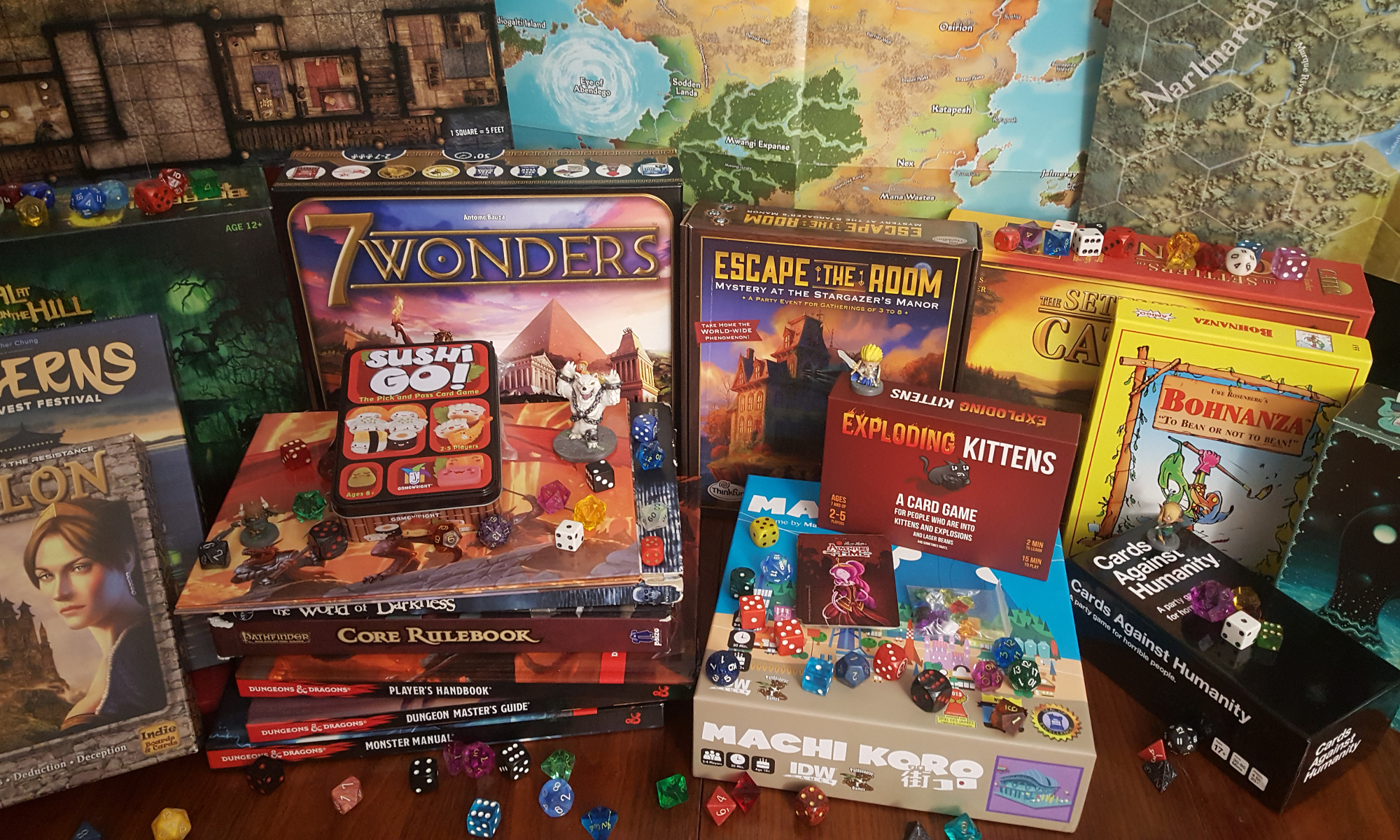The focus of today’s episode is how to ease newcomers to the tabletop board gaming hobby. When the average person thinks of “board games” and “card games,” they tend to think of the family game night games that everyone remembers with varying degrees of fondness (often completely unrelated to how enjoyable the games themselves were). Relating games back to these familiar touchstones makes it substantially easier to introduce newcomers to the hobby.
Games are built on a foundation of meta-ideas, and these can help us categorize games and identify individual elements in them that we tend to enjoy. While categorizing games exclusively on this criteria doesn’t typically allow you to
Resources
Nearly every modern board game has some sort of resource that has to be collected. In some games, this is an end in itself: games like Solarquest, Monopoly and Life all use play money to track your victory. This has to be spent to get certain in-game benefits, but, for the most part, getting money is an end in itself – you win by having the most or making your opponent have none.
In Lords of Vegas, Dominion and Illuminati, meanwhile, money isn’t the key to victory: just a resource to be spent in pursuit of ultimate victory. Hoarding money can further your goals and open strategic options, but, ultimately, you won’t win the game just by being the wealthiest players (the Gnomes of Zurich’s win condition in Illuminati notwithstanding).
In Ticket to Ride and Catan, resources are spent to make the moves of the game. Each turn, you have to have the resources to take any action, and, if you are doing poorly, you may simply find yourself working to get the resources you are missing.
Finally, in games like Dead of Winter and Forbidden Desert, resources are used to continue the game. In Forbidden desert, the players running out of sand, running out of time or anyone running out of water ends the game, while in Dead of Winter, not having the right resources can result in zombies overtaking you or your people starving. In both cases, the presence or absence of resources drives the game.
Turns
Games are all about taking turns right? Well, be that as it may, there are several ways to do this. In most traditional board games, the players take turns in a circuit, with each player taking a move and then passing to the next player when it is complete. Nearly all the classic family game night games, such as Monopoly, Life and Candyland, as well as some of the classic games such as Chess and Go use this rule.
In some games, however, each player commits to an action, then these are revealed simultaneously. Diplomacy, 7 Wonders (and nearly all drafting games such as Sushi Go and Go Nuts for Donuts, in fact) and Gloomhaven all feature rules where the players commit to their turns before revealing what they do. Sometimes, there’s a specific order in which things must be resolved, but, ultimately, it’s about the choice happening at the same time.
A few board games are even played in real time. Pit, Dutch Blitz, Space Cadets, Captain Sonar and Wartime are all real-time games with rules for resolving the action at a sometimes frantic, extremely personal pace.
Unit Management
A great many games have a unit management aspect to them. Most obviously, there are games wherein you control only one generic pawn with no special properties – Life, Monopoly and games to numerous to mention fall into this category. Here, the only important thing about your pawn is that it is differentiated from the others so you know who you are.
Then, there are games where non-unique pawns are allotted to you in groups with you deciding which to move and when. Sorry, Parcheesi, Trouble and many other such games exist, and I’m certain that a reader with some familiarity with games can easily think of many others. In a sense, one could even think of Risk or Checkers as being this sort of game.
Then, there are games wherein everyone controls a single pawn, but that pawn is a unique “character” with traits associated with it. Betrayal at House on the Hill, Arkham Horror, Forbidden Island/Desert, Super Dungeon Explore, Gloomhaven and many other such games exist, and while these can be thought of, in some cases, as a sort of proto role-playing-game, many of them don’t really go beyond being board games with an interesting quirk.
Controlling multiple unique pieces can be very interesting, and can be achieved to several degrees. In Onitama, there’s one special piece and several generic ones. In The Duke, Chess, Navia Dratp (who even remembers that nonsense?) and Shogi, each player has an assortment of pieces with different abilities. In Dead of Winter, you control a minimum of 2 unique characters with the opportunity to gain more. Notably, many of the games in the “you get one unique pawn” can be played optionally to have more than one per player.
Conclusion
What’s the point of meta-analyzing board games? If you’re interested in design, understanding what works when and why is an important first step to designing your own games. It can also help in understanding what kind of games appeal to your gaming group and your social circles. Finally, it can help when teaching the rules for a game to be able to relate it back to things the prospective player is familiar with. “It’s a real-time game like Pit” can be more useful than just saying that it’s a real time game so there are no turns. People relate better to past experience than abstract description.
Knowledge isn’t merely power in the broad sense, but also in the sense that it allows you to minimize the time spent floundering for understanding and maximize the time spend enjoying your past times. Happy gaming!

